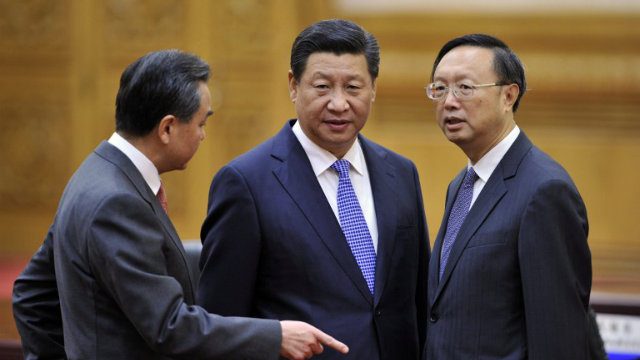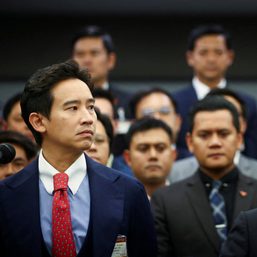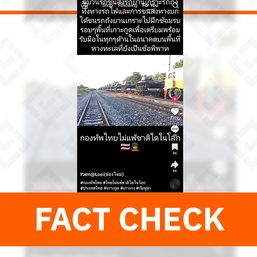SUMMARY
This is AI generated summarization, which may have errors. For context, always refer to the full article.

BEIJING, China – Chinese state-run media claimed victory on Saturday, November 8, for Beijing after it reached an accord with Japan to tone down tensions over territorial and historical disputes that had fuelled concerns of conflict.
The two sides issued similar statements Friday after a meeting in Beijing between State Councillor Yang Jiechi, China’s top foreign policy official, and Shotaro Yachi, Japanese Prime Minister Shinzo Abe’s national security adviser.
Relations between the Asian powers have plunged in the face of rows over disputed islands in the East China Sea and Japan’s 20th-century aggression against China.
A key point of contention is that Tokyo has long refused to formally acknowledge that there is a sovereignty dispute over the islands, which it controls and calls the Senkakus, but which are claimed by Beijing as the Diaoyus.
The Chinese statement said the two “acknowledged that different positions exist between them regarding the tensions” over the islands, while the Japanese text said they “recognized that they had different views as to the emergence of tense situations”.
Each used only their own name for the outcrops but both said they would set up a “crisis management mechanism” to keep the situation at bay.
Visits by Japanese politicians including Abe to Tokyo’s Yasukuni shrine, which honours Japan’s war dead including convicted war criminals, are another issue, and the statements said they would make efforts to “overcome political difficulties” rooted in historical issues.
The Friday’s declarations were widely seen as setting the stage for a summit between Xi and Abe on the sidelines of the upcoming APEC summit in Beijing.
But an editorial in the nationalistic Global Times tabloid Saturday, which is controlled by China’s ruling Communist Party, said the agreement was clear evidence Abe had given in to Beijing’s view.
“Now that Japan has agreed to sit down with China to talk about crisis management, it is equal to admitting that the disputes over the Diaoyu Islands’ sovereignty have become the new reality,” the paper said in an editorial.
“Abe’s… striving to meet Chinese leaders have shown that his reckless practices can no longer be sustained,” it added.
Still, Friday’s statement was carefully worded, and Japanese media insisted that it did not amount to a recognition of a dispute over the islands.
The conservative Yomiuri Shimbun paper argued that the reference to “different views” did “not impair Japan’s position so far that ‘there is no territorial dispute’,” and said Tokyo had “firmly” maintained its stance.
It quoted an anonymous “foreign ministry executive” as saying: “The Japanese side has not made any concession on territory.”
Speaking to reporters Saturday, China’s foreign minister Wang Yi suggested that any meeting between the two leaders ultimately depended on Japan’s actions regarding the agreement.
“We hope that the Japanese side could seriously treat this consensus, implement it faithfully and honour its commitment and create the necessary and favourable atmosphere for a meeting between the two leaders,” he said.
He also said that Beijing “attaches importance to the aspirations raised by Japan many times”, an apparent reference to Tokyo’s oft-stated desire for a summit.
Wang’s comments lacked the strong and often strident tone of Beijing’s official pronouncements on its disputes with Tokyo.
Ships and aircraft
The long simmering tensions between the two nations erupted two years ago when the Japanese government purchased from private owners the rest of the islets in the chain it did not already own, prompting vehement protests by Beijing and anti-Japanese demonstrations in China.
Increased patrols by ships and aircraft from the two sides in the seas and skies around the rocky islets have raised fears of armed clashes between the world’s second- and third-largest economies.
But Japanese national TV broadcaster NHK reported Friday that the two sides “agreed to arrange a summit next week” in Beijing on the sidelines of the Asia-Pacific Economic Cooperation gathering.
While neither side has publicly confirmed a summit, Wang and his Japanese counterpart Fumio Kishida were holding talks Saturday.
Nonetheless the accord is unlikely to erase all tensions overnight, one Chinese analyst said.
“The ice between China and Japan is too thick to melt in one day,” Yang Bojiang, deputy head of the Institute of Japan Study at the Chinese Academy of Social Sciences, said, according to the state-run Xinhua news agency.
“China-Japan relations are likely to see a new balance between cooperation and confrontation.” -Rappler.com
Add a comment
How does this make you feel?





There are no comments yet. Add your comment to start the conversation.